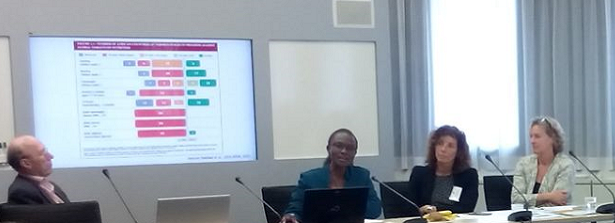Transforming Food Systems for Improved Nutrition

African Union members demand the international community to support them in their ambition of a nutrition revolution. Transitions of African food systems are at a crossroads: there is an opportunity to prevent the mistakes made in OECD countries, where reducing undernutrition was accompanied by a pendulum swing in the direction of overnutrition and environmental degradation. A food systems approach, including multi-sectoral collaboration such as with the agricultural sector, is a key entry point.
Please find below some of the highlights from a lunch meeting entitled “Transforming Food Systems for Improved Nutrition” on June 29 2017.
Recent nutrition data show high levels of stunting, wasting and obesity across Africa, and too little progress against global nutrition targets. Only child overweight is still being effectively addressed. Keeping these overweight rates below 5% would be an important contribution to the health of future generations.
For higher impact, improved dietary quality should be the key policy ambition. It can be achieved through ambitious multi-stakeholder and multi-sectoral collaboration in a food systems approach. Working together through this approach helps defining the particular roles and contributions of each stakeholder. Ambitions of different sectors but also interests of consumers and farmers need to be balanced and incorporated in this joint work. Practical solutions should be developed for this, particularly embedded in what works at local level. And tradeoffs need to be addressed effectively. African countries have the networks in place for an effective joint response, particularly the Scaling Up Nutrition movement and the Comprehensive Africa Agriculture Development Programme.
Nevertheless, the reality in different countries shows that much needs to be done, both at practical and at policy level. Current agricultural policies do not always foster improved dietary quality. There seems to be a mismatch between the food produced at national level and the nutrition needs of particular groups. CAADP, individual African countries and the international community should leave their staple food focus and orient their work towards diversification.
However, while the agricultural sector should supply nutritious foods, consumers need to be motivated to eat a healthy diet. Unfortunately there are no silver bullets for this. Countries in different parts of the world need to learn from effective approaches. The Netherlands is for example also not yet very successful in addressing overweight and obesity. An asset to be tapped into to improve consumer behavior is the private sector’s knowledge about markets and about food purchasing behaviors. Nevertheless, for this to happen innovative policy and legislation are needed to foster the quality of diets and address the fact that current market prices for nutritious foods are often higher than those of products with potential harmful health effects.
Interesting example interventions are the Vegetables for All programme in Tanzania (AIM and partners), the HGSF programme in several African countries (IFPRI), but also a voucher programme supporting that farmers diversify their crops (EU). The Fill the Nutrient Gap (WFP) tool is a relevant analytical tool to measure the affordability of a healthy diet. A salt law in South Africa is an example of legislation enhancing the quality of processed foods.
A food systems approach was considered as a key entry point to realize the ambitions of this nutrition agenda for Africa. Nevertheless, the meeting did not yet fully explore the potential of this concept and its use. Wageningen University, Ministry of Economic Affairs, PBL and other interested organizations have joint forces to collaborate in a multi-stakeholder knowledge network on food systems, facilitated by the Food & Business Knowledge Platform.
Please download the full summary of the lunch meeting here, including background information.
Please download the PowerPoint presentations by Namukolo Covic, Saskia Osendarp, and Heleen Bos.
Please see the IFPRI report “Achieving a nutrition revolution for Africa: The road to healthier diets and optimal nutrition” in our Knowledge Portal.






